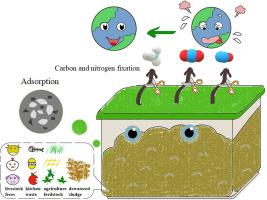Science of the Total Environment ( IF 8.2 ) Pub Date : 2022-05-30 , DOI: 10.1016/j.scitotenv.2022.156355
Danlian Huang 1 , Lan Gao 1 , Min Cheng 1 , Ming Yan 1 , Gaoxia Zhang 1 , Sha Chen 1 , Li Du 1 , Guangfu Wang 1 , Ruijin Li 1 , Jiaxi Tao 1 , Wei Zhou 1 , Lingshi Yin 1

|
堆肥作为一种常规的固体废物处理方法,在碳氮保护方面发挥着至关重要的作用,从而减少养分和能量的损失。但由于操作条件的不同,在堆肥过程中不可避免地会释放出一些含碳、氮的气体,造成碳、氮的损失。为了克服这一障碍,许多研究人员一直在尝试优化调整参数并添加一些修正(即物理修正、化学修正和微生物修正),以减少损失并加强碳和氮的保护。然而,关于碳和氮保存机制的研究是有限的。因此,本综述总结了有关物理修正的研究,化学改良剂和微生物改良剂,提出了增强碳和氮保存的潜在机制:吸附或转化,并评估了它们对缓解温室效应的贡献,为后续堆肥相关研究人员更好地改善碳和氮提供了理论基础。氮保护措施。本文还建议:评估堆肥作为一种过程对全球温室气体减排的贡献需要对堆肥进行完整的生命周期评估。目前缺乏堆肥熟料对应用场地碳氮封存能力的影响,需要更多的研究人员去探索。并评估其对减缓温室效应的贡献,为后续堆肥相关研究人员更好地改进碳氮保护措施提供理论依据。本文还建议:评估堆肥作为一种过程对全球温室气体减排的贡献需要对堆肥进行完整的生命周期评估。目前缺乏堆肥熟料对应用场地碳氮封存能力的影响,需要更多的研究人员去探索。并评估其对减缓温室效应的贡献,为后续堆肥相关研究人员更好地改进碳氮保护措施提供理论依据。本文还建议:评估堆肥作为一种过程对全球温室气体减排的贡献需要对堆肥进行完整的生命周期评估。目前缺乏堆肥熟料对应用场地碳氮封存能力的影响,需要更多的研究人员去探索。评估堆肥作为一个过程对全球温室气体减排的贡献需要对堆肥进行完整的生命周期评估。目前缺乏堆肥熟料对应用场地碳氮封存能力的影响,需要更多的研究人员去探索。评估堆肥作为一个过程对全球温室气体减排的贡献需要对堆肥进行完整的生命周期评估。目前缺乏堆肥熟料对应用场地碳氮封存能力的影响,需要更多的研究人员去探索。

"点击查看英文标题和摘要"



































 京公网安备 11010802027423号
京公网安备 11010802027423号